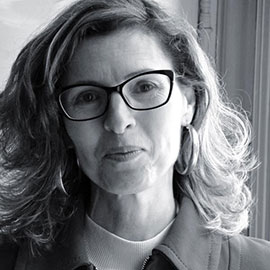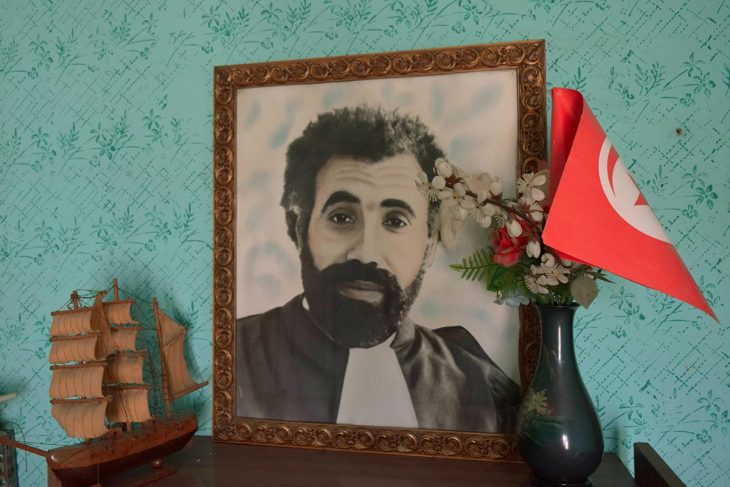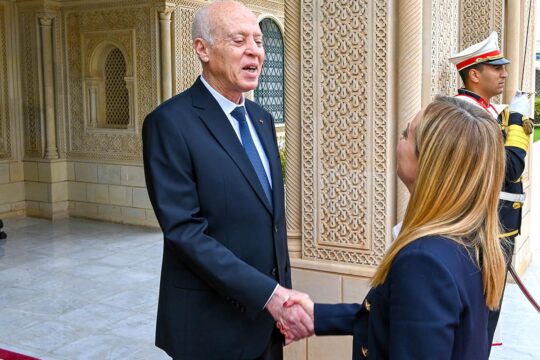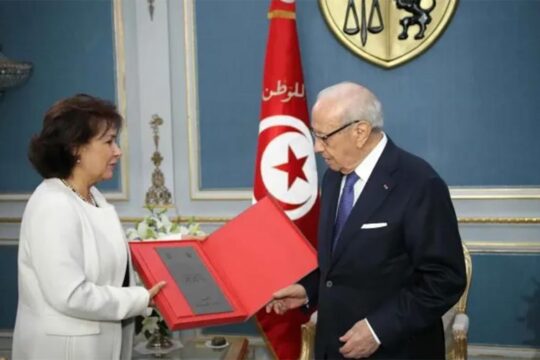His relatives, friends, colleagues and fellow activists had taken the same winding, dusty, bumpy path 36 years ago to the Bouarada cemetery, 72 km south-west of Tunis. It is there, in this wild, mountainous landscape scattered with olive trees, in this hilly vastness battling with the winds, that they had come to bury Sadok Hichri, the leader of the Arab nationalist Baath Party, who was found mysteriously dead on 20 June, 1984, at the age of 36. And it is there again that Tunisians returned on 20 June 2020 to pay tribute to his memory.
Flowers, bouquets, tears and speeches were shared by the grave. The moment of collective remembrance was solemn. But something has profoundly changed since the funeral of the lawyer and nationalist activist: no security agent watched over Saturday’s gathering, which was joined early in the morning by representatives from Tunis of the World Organization Against Torture, the Tunisian League for Human Rights and several members of the National Bar Association. The absence of soldiers, police and intelligence agents who closely controlled the area at the time of Sadok Hichri's burial and wrote reports against all those who came - lawyers, judges, intellectuals and political opponents - shows how things have changed in Tunisia since the 2011 revolution.
A tribute in the hands of the young
"It is thanks to activists for human rights and freedom of organization and expression, men who are ready to go to extremes to defend their values and principles, such as Sadok Hichri, that we enjoy all our fundamental rights today and that the police are no longer on our heels. He deserves this tribute," said Khalifa Fetati, Baath Party representative at the ceremony.
The dominant profile of those present at the cemetery on this windy morning also seemed very different from the day of the funeral under heavy guard. Young people from the two local associations "Volontaires de Bouarda" and "EcoRada" filled the place, cameras in hand. They were, in fact, the real organizers of this day of commemoration, taking charge of the cultural programme, the production of a documentary on the life and work of the "Martyr of Bouarada" and the details of how the tribute would take place.
Omar Oueslati is a well-known personality in this small agricultural town in the southwest. He is the real linchpin of this commemorative event. An independent and dissident judge in the time of President Ben Ali, an activist with the Tunisian League for Human Rights and vice-president of the highly publicized High Independent Authority for Audiovisual Communication (HAICA), this 46-year-old magistrate remains rooted in his hometown, even though he lives and works in Tunis. It was he who in 2016 created the Association Volontaires de Bouarada (Bouarada Volunteers Association), most of whose members are under 25 years of age. "I wanted the girls and boys of the association to take ownership of the history of their city and to identify themselves with it particularly through the knowledge of the personalities who have lived there. Our memory embodies our richness as well as being a reference point for the whole community," he explained.
From military academy to dissent
But there's a catch. Despite repeated requests from many associations, the municipality still refuses to name a square after Sadok Hichri. Hence the rally on 20 June. “After the publication of several protest statements, we decided to take action and organize this event, which is part of our transitional justice and collective remembrance work. We are seeking to broaden public support for our project," added Omar Oueslati. During the speeches by Sadok Hichri's companions and relatives, held at the city's Maison de la Culture, the young Bouarada Volunteers immersed themselves in the various phases of the extraordinary journey of this activist, whom some call a hero.
So many travels, clandestine departures, exile, secret missions, commitments, meetings, writings, speeches, threats, persecution and police harassment indeed marked Sadok Hichri's life. At the age of 16, he entered the military academy but was banned from continuing his studies there after organizing a demonstration in support of Palestine in 1967. Tried by the Military Tribunal, he was sentenced to four years in prison and five years under house arrest. But the young man managed to escape the tight police surveillance of President Bourguiba. In 1974, he went clandestinely to Algeria, where he obtained his baccalaureate and then, in 1974, a degree in Arabic literature. However, because of his political activism and his friendships with political opponents, he was expelled to Tunisia, where he was once again subjected to the repressive system of administrative control that forced dissidents to check in several times a day at the police station.

Law, human rights, theatre and politics
With letter after letter, Sadok Hichri succeeded in convincing the authorities to lift the control he was subjected to like a hostage. He was then recruited as a teacher in a high school in the region, while continuing his law studies to make an old dream come true: to be a lawyer to defend those banished from the Earth, the vulnerable and the victims of social and political injustice. At the end of the 1970s, he was barely 30 years old when he founded the regional section of the Tunisian League for Human Rights, created the youth section of the Baath party and launched a cultural magazine, "Le chercheur" (The seeker), as well as a committed art troupe, "Le Théâtre des gens" (People’s Theatre). His profession as a lawyer seemed to double his energy and motivation. His political work was increasing. In the party, his dynamism and charisma made him the man for difficult missions. For example, he was in charge of collecting funds for the Palestine Liberation Organization (PLO) and coordinating the money transfer operation in Lebanon, where the PLO leaders were located. His aura and network extended to most Arab countries.
Following an article published in February 1984 criticizing Gaddafi's Libyan regime - which at the time had unionist ambitions in the Arab world - a car started following him constantly. The Tunisian authorities warned him that his life was in danger. He was offered protection but he refused for fear of being spied on by the regime. On 20 June 1984, Sadok Hichri was found dead in his bathtub.
Mysterious death
"He died of gas asphyxiation in his apartment in downtown Tunis," claimed Khalifa Fetati. "Strangely, no medical examiner's report has been published and no investigation has been opened into the circumstances of this sudden and obscure death," he said.
The Baath Party accused the Tunisian authorities of being behind the elimination of Sadok Hichri, a man who had become a nuisance in a political system that tolerated no opposition and abhorred all Arabist ideologies. But others see in the tragedy a settling of scores by the Libyan authorities, made possible with Tunisian complicity.
This mysterious case of Sadok Hichri's death will be opened on 2 July before the specialized transitional justice chamber in Tunis.
In the hall of the Maison de la Culture, speeches were interspersed with poetry readings in homage to Bouarda's "prodigal son", patriotic songs and short plays. A documentary was shown on Sadok Hichri's fight for freedom and dignity. In his lawyer's office, filmed by a young director who is a member of the Volunteers association, we noticed that the walls were decorated with photos of Saddam Hussein, the absolute leader of the Iraqi Baath party. The atmosphere, good-natured and lively, was full of emotion. The public, who came in large numbers from a town where nothing happens and whose cultural scene is lacking, shouted repeatedly: "Faithful forever to the blood of the martyrs!”. The youth of the Baath Party was very present in the hall. Its members were dressed in T-shirts bearing the effigy of the founding father of their movement.
Mayor stays away
But neither the mayor, a member of the Islamist movement Ennahdha, nor any representative of the municipal team was present at the commemoration.
For Tarak Zakraoui, of the regional section of the Tunisian National Bar Association, the country has not left the sad legacy where a town representative does not attend an event organized in homage to a representative of another political movement, so as not to be accused of treachery. "Partisan lines still dominate and take precedence over the interest of the commune," said Zakraoui. "Democracy is based on plurality. If we want to exclude peaceful activists from their right to remembrance because we disagree with their ideas, we will automatically return to the monolithic way of thinking, from which we have suffered for decades," he added.
As Adel Maizi, former president of the Commission for the Preservation of Memory at the Truth and Dignity Commission (IVD) -- the Tunisian truth commission that published its final report in March 2019 -- recalled, the preservation of memory is, according to the law on transitional justice, "a right guaranteed to all successive generations of Tunisians. It is also an obligation of the state and all the institutions under its jurisdiction, including municipalities”. The IVD has devoted a good part of its report to proposing all forms of memorials, museums, commemorations and tributes, in order to encourage the population to work on remembrance and recognition of past violations without politicizing this process.
The mayor, for his part, defended himself from criticism. "We named the street where Sadok Hichri lived after him and we named last summer's town festival "Sadok Hichri Season". What more do we want? Never before has a martyr been so honoured. The naming of the place claimed by his friends and supporters, which is central to the town, is not unanimously supported by the city council. There are differences of opinion on this project. We recently decided to call it "Revolution Square"," said Mongi Ben Metjaoual.
It was 2 p.m. when the cars left the house of culture to cross the town, where many streets sink into anonymity. Only a series of numbers name the roads of Bouarada. The vehicles finally stopped in front of the square which faces both the city council and the police station. It is here that Sadok Hichri had appeared daily, more than forty years ago, to confirm his presence under house arrest. Slogans in homage to the "martyr" were now ringing out -- as if to reach the ears of a mayor and a city council that had remained deaf to their request.






